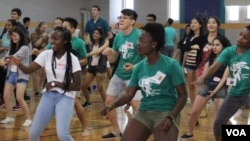More than one-third of international students polled say they wish their professors would try to understand them better and provide helpful advice, a recent study says.
"When I was in Ethiopia, I was taught to be more reserved, more quiet," says Kedest Mathewos, 19, from Addis Ababa, Ethiopia. "Whereas here, everyone tends to speak up, express their opinions all the time. So, it’s kind of hard to get used to that."
ELS Educational Services polled 662 international students at 23 U.S. colleges and universities, and presented its findings in February at the Association of International Education Administrators (AIEA) conference in Washington. ELS operates more than 80 language learning centers at U.S. colleges to help students improve their English. AIEA focuses on "advancing the international dimensions of higher education," says its website.
Many students expressed concern about their relationships with professors. About one-third of the students polled said they wished that professors would offer:
Many international students believe that if they can pass standardized tests like TOEFL or SAT, they can understand lectures and thrive in American classrooms, says John Nicholson, vice president of marketing and communications for ELS.
But passing a language test does not prepare international students for cultural differences in a new learning environment, he says.
"Ultimately, to be successful in a classroom you have to understand what the expectations are, but also, the right way to express concerns and questions," Nicholson says.
This complaint among international students is common, says Lisa Giragosian, director of the international student office at Duke University in Durham, North Carolina. She says teachers should help international students deal with cultural misunderstandings.
"For every faculty member who’s very conscious … and globally-minded and seeking an international student’s opinion, there’s somebody else who’s not," she says.
Professors in the U.S. expect students to ask questions and lead discussions, while international classrooms do not focus on class participation. Some cultures see participation as impolite and too bold.
Giragosian suggests that international student seek help before they begin their studies in the U.S. They should meet with professors during office hours outside of class as needed, and meet with other international students to discuss concerns and practice speaking in class.
International students add to the experiences of American students, Giragosian says, and professors need to be open to all students. Duke offers training for professors to better understand how international students think and learn.
Mathewos began studying global health at Duke in August 2016. The 19-year-old attended an international high school in her home country, which prepared her for what to expect in the U.S. But she still struggled at first, even with extra preparation, she admits.
Mathewos, who earned a scholarship from a MasterCard program, says it has helped by connecting her with past members. She has learned from their experiences, she says, and passes that along to her international colleagues.
She often meets with other international students to talk about their shared problems, like those listed in the ELS study. And she recently created a program that gives letters to professors at the beginning of a study term, asking them to consider the special challenges international students face.
What problems do you have as an international student in the U.S.? How do you think international students and professors can work together better? Please leave a comment here, and visit us on Facebook, Twitter, Instagram and LinkedIn, thanks!
"When I was in Ethiopia, I was taught to be more reserved, more quiet," says Kedest Mathewos, 19, from Addis Ababa, Ethiopia. "Whereas here, everyone tends to speak up, express their opinions all the time. So, it’s kind of hard to get used to that."
ELS Educational Services polled 662 international students at 23 U.S. colleges and universities, and presented its findings in February at the Association of International Education Administrators (AIEA) conference in Washington. ELS operates more than 80 language learning centers at U.S. colleges to help students improve their English. AIEA focuses on "advancing the international dimensions of higher education," says its website.
Many students expressed concern about their relationships with professors. About one-third of the students polled said they wished that professors would offer:
- More helpful advice about adapting to the American classroom
- Understanding for the international student experience
- Class materials that used more non-U.S. examples
Many international students believe that if they can pass standardized tests like TOEFL or SAT, they can understand lectures and thrive in American classrooms, says John Nicholson, vice president of marketing and communications for ELS.
But passing a language test does not prepare international students for cultural differences in a new learning environment, he says.
"Ultimately, to be successful in a classroom you have to understand what the expectations are, but also, the right way to express concerns and questions," Nicholson says.
This complaint among international students is common, says Lisa Giragosian, director of the international student office at Duke University in Durham, North Carolina. She says teachers should help international students deal with cultural misunderstandings.
"For every faculty member who’s very conscious … and globally-minded and seeking an international student’s opinion, there’s somebody else who’s not," she says.
Professors in the U.S. expect students to ask questions and lead discussions, while international classrooms do not focus on class participation. Some cultures see participation as impolite and too bold.
Giragosian suggests that international student seek help before they begin their studies in the U.S. They should meet with professors during office hours outside of class as needed, and meet with other international students to discuss concerns and practice speaking in class.
International students add to the experiences of American students, Giragosian says, and professors need to be open to all students. Duke offers training for professors to better understand how international students think and learn.
Mathewos began studying global health at Duke in August 2016. The 19-year-old attended an international high school in her home country, which prepared her for what to expect in the U.S. But she still struggled at first, even with extra preparation, she admits.
Mathewos, who earned a scholarship from a MasterCard program, says it has helped by connecting her with past members. She has learned from their experiences, she says, and passes that along to her international colleagues.
She often meets with other international students to talk about their shared problems, like those listed in the ELS study. And she recently created a program that gives letters to professors at the beginning of a study term, asking them to consider the special challenges international students face.
More than 1 million international students attend college or university in the U.S. They added $32.8 billion to the U.S. economy last year.
This story first appeared in Learning English.What problems do you have as an international student in the U.S.? How do you think international students and professors can work together better? Please leave a comment here, and visit us on Facebook, Twitter, Instagram and LinkedIn, thanks!





